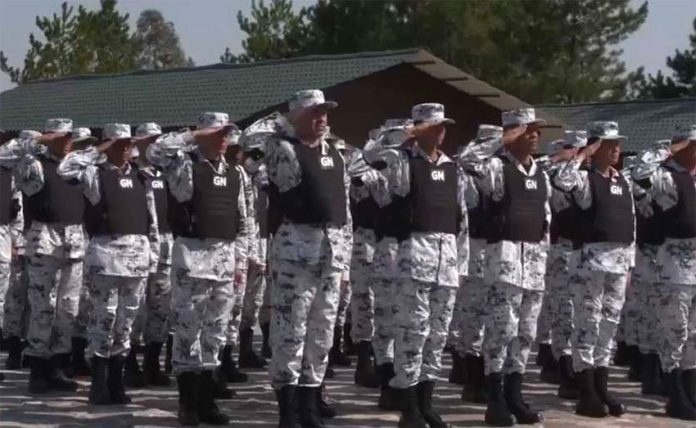Security Secretary Alfonso Durazo announced that 52,000 National Guard troops will be deployed on June 30 to the country’s 150 most violent regions.
Speaking at a regional security meeting yesterday in Chihuahua, Durazo said that northern border states are included in the government’s deployment plans.
The secretary said that 1,800 troops will be sent to Ciudad Juárez, Urique, Parral and Cuauhtémoc in Chihuahua and that the same number will be deployed to Sonora, mainly in and around Ciudad Obregón, where there have been 48 homicides this month.
The troops to be deployed at the end of the month will be newly-trained National Guard members who previously belonged to the federal, military and naval police.
Their June 30 deployment will come immediately after their graduation from a 584-hour training course which includes education on the criminal justice system, the use of force and respect for human rights.
“These elements will be deployed immediately to the 150 regions in which we’ve divided the country to attend to the issue of security,” Durazo said.
The secretary had previously identified six states as insecurity hot spots – Puebla, Nuevo León, Jalisco, Guanajuato, Veracruz and Tamaulipas.
The new security force was first deployed to Minatitlán, Veracruz, in late April a week after 13 people were killed in an attack on a bar in the city.
Durazo explained that a second generation of new troops will graduate in September and a third in December.
At the end of the year, the National Guard – the centerpiece of the government’s security strategy – will have a total of 82,000 troops, he said.
Durazo said the use of the National Guard to control migration represents a fundamental change to the security force’s planned function but explained that it is necessary due to the massive arrival of migrants in the country.

After yesterday’s meeting with northern state governors and security officials, the secretary told reporters that federal security forces and other authorities have ramped up efforts to shut down people smuggling operations.
“Collaborating with several agencies, joining forces, we’re making a very significant effort to . . . dismantle human trafficking networks that have unfortunately become stronger in the country,” he said.
Police stopped four semi-trailers transporting almost 800 undocumented migrants in Veracruz last Saturday and authorities have moved to block the bank accounts and seize the assets of those responsible for the people smuggling attempt.
As part of a migration agreement with the United States, Mexico also committed to sending 6,000 National Guard troops to the southern border to enforce stricter immigration policies.
Foreign Secretary Marcelo Ebrard said yesterday that the deployment has been completed and that 650 positions have been filled in the National Immigration Institute to improve security at border crossings.
A federal official who requested anonymity told the Associated Press that the National Guard troops have not been visible in large contingents because they are spread along the entirety of the 1,000-kilometer-long southern border as well as in the Isthmus of Tehuantepec region.
The elements have been deployed to remote areas to target human smugglers, the official said.
As Mexico steps up enforcement against undocumented migrants, moves are also under way in the United States to bolster border security.
Texas Governor Greg Abbott announced yesterday that his government will deploy 1,000 Texas National Guard troops to the United States-Mexico border to support federal security efforts.
“The crisis at our southern border is unlike anything we’ve witnessed before and has put an enormous strain on the existing resources we have in place,” he said.
Source: Milenio (sp), Excelsiór (sp), El Universal (sp), The Associated Press (en)
